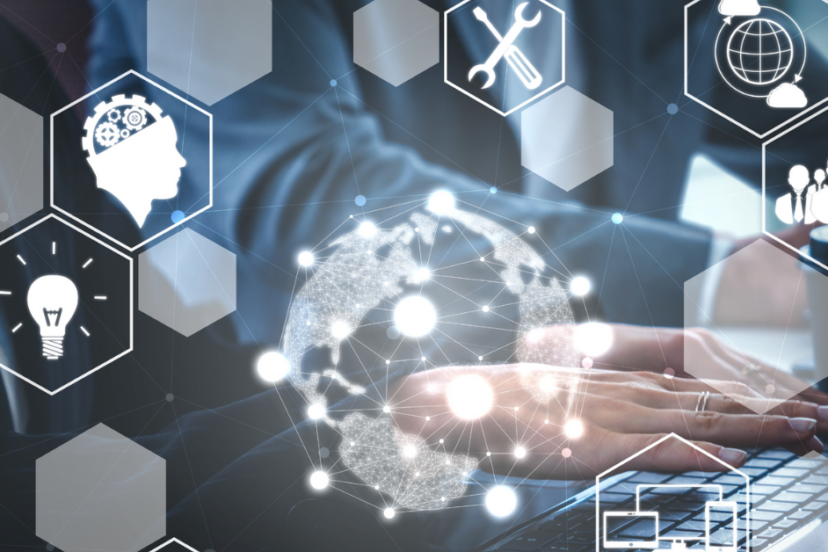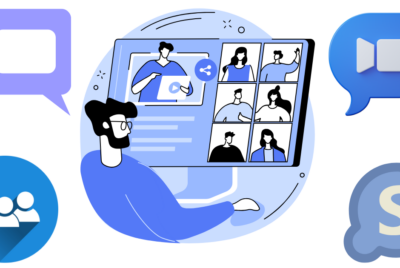How AI and Business Combination Stay Ahead of the Competition
Consider a world where algorithms can learn, adapt, and make expert judgments. AI innovation is boundless. Businesses looking for competitive advantage are currently using AI. Let’s dive into AI and business around the world.
AI is changing how businesses operate and interact with customers, From process optimization that boosts productivity to predictive analytics that predict market trends to personalized customer experiences that build loyalty.
If you’re a techie, a business owner, or interested in the modern economy, this will inspire you with AI’s unlimited possibilities. Let’s see how this powerful technology transforms industries, improves efficiency, and reshapes business.
The Concept of AI
AI is a branch of computer science that develops intelligent machines. These include interpreting natural language, identifying patterns, problem-solving, and decision-making.
What distinguishes AI? It’s about learning. AI systems have different rules than traditional software. Experience teaches. Machine learning algorithms learn from data to improve over time.
As the digital era progresses, AI opens new opportunities. This potential can transform businesses. But how? Read on to learn how AI is changing business.
AI Adoption in Business
AI is no longer a ‘nice-to-have’ feature or a science fiction concept in business. Companies of all sizes are actively adopting AI technologies. Optimization, decision-making, customer experience, and innovation drive its adoption.
AI implementation was a massive project for major firms with lots of resources. AI technology is now more accessible. Cloud computing and MLaaS platforms allow even small enterprises to use AI without a significant investment or specialized knowledge.
Today’s fast-paced digital environment requires businesses to use AI. Businesses that quickly use AI will thrive and outperform their competitors. AI is rewriting business rules. Let’s explore how AI is transforming businesses.
Impact of AI on Businesses
The impact of artificial intelligence on enterprises is varied and transformational. It’s like a chain reaction, where one change causes a chain reaction of others, resulting in a completely different corporate landscape.
1. AI and Automation
One of the most transformative forces in today’s corporate environment is automation by AI. Consider the most repetitive jobs in a company—those that require a significant amount of time and resources but require little to no creative or decision-making abilities. AI is taking over these tasks, freeing human resources for higher-value processes.
Robotic Process Automation
Business is buzzing about RPA, an interesting AI application. Imagine a workforce without sleep, breaks, or mistakes. RPA delivers. Software bots automate repetitive, rule-based processes, improving efficiency and accuracy.
RPA lets workers focus on critical thinking, creativity, and interpersonal skills, which machines can’t accomplish. RPA helps humans to focus on strategic tasks that promote development and innovation.
Intelligent Automation
Intelligent automation can handle contracts, unstructured data, and complex client interactions. It improves efficiency and accuracy and adds adaptability and learning to standard automation.
Intelligent automation’s ability to learn and manage complex tasks makes it valuable. It is essential to digital transformation since it boosts efficiency, innovation, and growth. As we learn more about AI, intelligent automation will become more possible, offering fascinating future possibilities.
2. AI and Process Optimization
AI is a game-changer in process optimization, driving significant efficiency, productivity, and decision-making improvements.
Smart Workflow Processes
Business workflows can entail many tasks, roles, and decision points. AI manages and optimizes workflow in real-time, improving efficiency and production. It helps firms uncover process inefficiencies, recommend changes, automate operations, and make data-driven strategic decisions.
Intelligent processes use AI beyond automation. AI can recognize patterns, predict bottlenecks, and offer process changes using past workflow data. For instance, if the AI system notices that a workflow phase frequently causes delays, it may advise rearranging jobs or distributing them to different team members.
Decision-Making with AI
Effective decision-making drives company success in a fast-paced environment. However, the growing complexity of business operations and the abundance of data can make educated decisions difficult. AI is transforming decision-making.
AI is helping businesses make more educated, accurate, and proactive decisions. It’s allowing companies use data strategically to develop, innovate, and compete. As AI technology advances, its role in decision-making will grow, presenting fascinating economic prospects.
3. AI and Predictive Analytics
Predictive analytics powered by AI is assisting businesses in anticipating the future, making data-driven decisions, and gaining a competitive advantage. It transforms data into a strategic asset that drives efficiency, innovation, and growth. As AI technology advances, the potential of predictive analytics will expand, opening up exciting new opportunities for businesses across all industries.
Predicting Customer Behavior
AI finds patterns in past purchases, browser history, and customer interactions. Businesses can predict client requirements and wants by using these patterns. Predicting customer behavior informs marketing tactics. Companies may increase engagement and conversion rates by targeting future customer needs.
Businesses can use AI’s consumer behavior predictions to improve marketing, customer experiences, and sales. It allows firms to anticipate client needs and stay ahead of the competition.
Forecasting and Market Analysis
Forecasting has always been difficult, relying on previous data and neglecting various external influences. AI can improve forecasting by examining historical trends, economic data, market situations, and consumer behavior patterns.
AI is revolutionizing forecasting and market analysis, giving organizations data-driven insights to predict market trends, make strategic decisions, and remain ahead of the competition. As AI improves, its forecasting and market analysis will shape business strategy and decision-making.
4. AI and Customer Experience
AI allows businesses to delight customers with tailored, responsive, and proactive experiences. It will shape customer engagement and loyalty as it evolves.
Personalization with AI
Consumers want customized experiences in the digital age. As AI advances, businesses will have more options to engage and delight customers. Personalization will rise as AI evolves, offering exciting chances for companies to engage and delight customers.
AI-powered Customer Support
Consumers want customized experiences in the digital age. AI is revolutionizing customer service by making it more efficient, personalized, and proactive. It improves the customer experience, increases customer happiness, and enables organizations to provide exceptional service at scale.
As AI technology advances, its impact on customer assistance is expected to expand, presenting exciting prospects for businesses to improve their customer service and differentiate themselves from the competition.
The Future of AI in Business
As AI advances, businesses will have more options to engage and delight customers. After exploring AI’s tremendous impact on numerous business elements, it’s evident that AI is not simply a trend but a fundamental change in how firms run and grow. Business AI has a bright future. AI will boost business efficiency, innovation, and customer engagement. Businesses must carefully negotiate data privacy and ethical issues with this potential.
AI will continue to reshape the business landscape in ways we can only fathom, driving growth, innovation, and competitive advantage.
Conclusion
Consumers want customized experiences in the digital age. As AI advances, businesses will have more options to engage and delight customers. It has transformed business, sparked extraordinary innovation, and helped firms outperform the competition.
As we look ahead, AI is rewriting business rules, not just replacing them. It’s ushering in a new business era when AI mastery is no longer a luxury but a requirement. Businesses that embrace this future have limitless potential.
So, are you ready to leverage the power of AI in your business and gain a competitive edge? The future is here, and AI powers it.
FAQs
How is AI transforming business operations? AI is revolutionizing businesses through automation, process optimization, predictive analytics, and improving customer experience.
What is the role of AI in process optimization? AI can identify inefficiencies, suggest improvements, and streamline workflows, significantly enhancing productivity and efficiency.
How does AI improve customer experiences? It provides personalized customer experiences and instant, efficient customer service through AI-powered chatbots and virtual assistants.
How does AI provide a competitive edge in business? AI gives businesses a competitive edge by automating tasks, optimizing processes, predicting trends, and improving the customer experience.
What is the future of AI in business? The future of AI in business looks promising, with AI expected to transform every aspect of business operation, driving efficiency, innovation, and a competitive advantage.





Comments are closed.